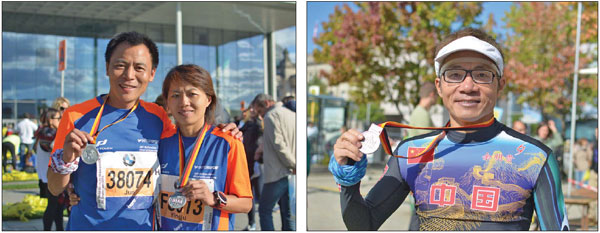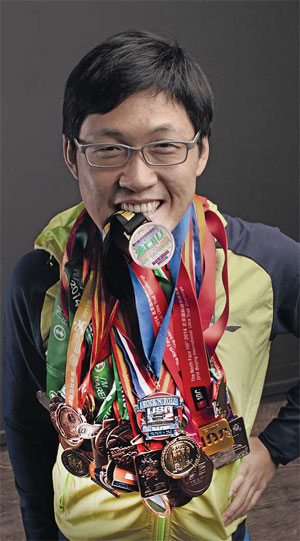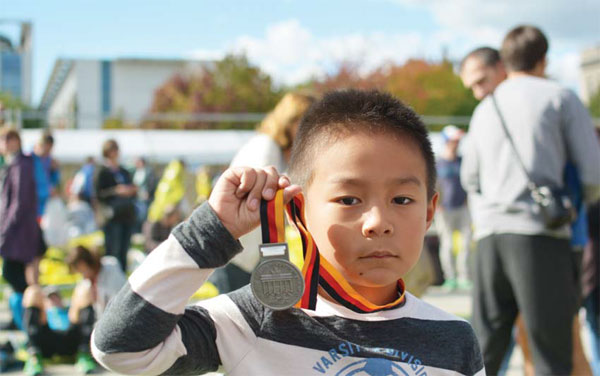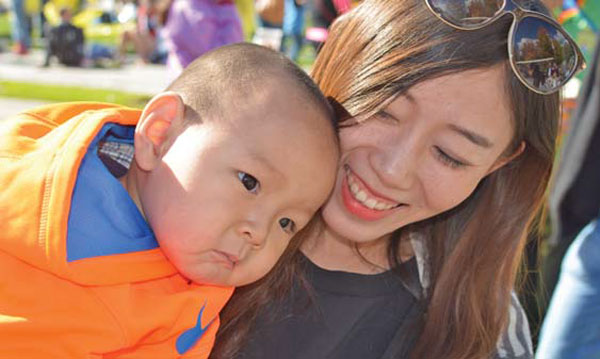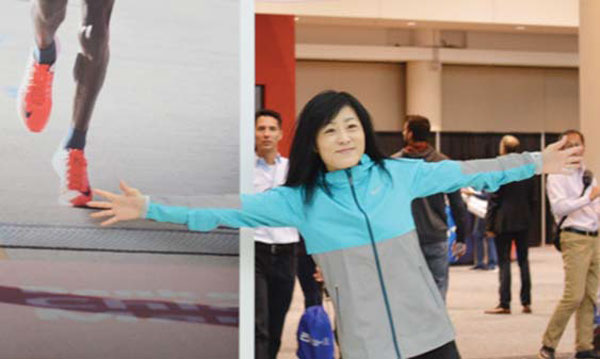Running the world
Updated: 2016-04-29 08:24
By Matt Prichard, Yan Dongjie and Yu Yilei in Beijing and Wang Mingjie in London(China Daily USA)
|
||||||||
Well-off, fitness-focused Chinese are busy snapping sweaty selfies at international marathons
Xie Guoping had always kept in shape. The former real estate company owner from Shanghai hiked, climbed mountains and played badminton, and her friends did, too.
But the 50-year-old says that in 2013 her friends took up a new pursuit: running.
Soon she was completing marathons, and before too long she was flying around the globe to participate in the some of the world's best-known sporting events.
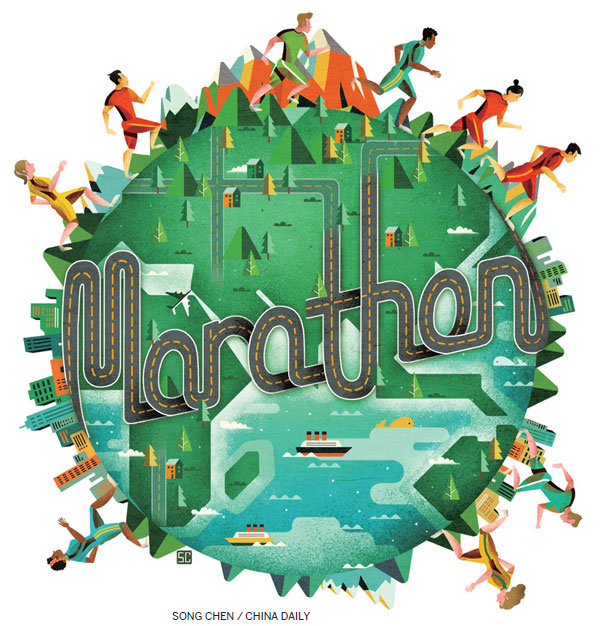
|
Chinese runners are flying around the globe to participate in the some of the world's best-known marathon events, such as Xie Jun and his wife Qi Yingju, and Yu Minggui (right), who finished the Berlin Marathon last year. Photos Provided to China Daily |
Xie and her friends are not alone. A growing interest in fitness has propelled running into a major sport in China. At the same time, expanding prosperity has meant Chinese runners have gone from being rare at international marathons to having a noticeable presence.
This year, 150 Chinese - 106 men and 44 women - registered for the April 24 London Marathon, a race that attracts 38,000 runners annually and is one of the six top marathons in the world.
That's a 417 percent increase from the 29 Chinese entrants - 22 men and seven women - last year, organizers say. And in 2014 there were only 11 - seven men and four women.
"This trend caught my attention about three years ago," says Du Mingrui, 34, general manager of ZX-Tour Co, who is also a keen runner. "The number of Chinese going abroad to run is growing tremendously."
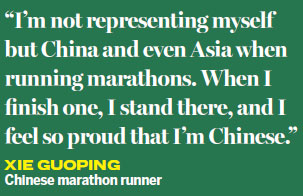
His company, which specializes in organizing training camps and tours, is among a number of enterprises serving the growing legion of Chinese runners.
Last year, just three Chinese people took part in the Jerusalem Marathon, including two who were local residents, according to Du. The number surged to 156 at this year's event, held on March 18.
More than 700 Chinese also entered the Berlin Marathon, one of the top international events, in September, he adds.
'Proud that I'm Chinese'
The Chinese presence at international marathons also is a point of pride as an emerging China makes its mark in many global spheres.
"I'm not representing myself but China and even Asia when running marathons," Xie says. "When I finish one, I stand there, and I feel so proud that I'm Chinese."
That presence also means people from other nations have greater exposure to, and camaraderie with, sophisticated and health-conscious Chinese people.
As for first impressions, "running is much better than (going abroad to) have a baby or purchase goods", says Wang Xiaogang, 40, a Beijing running coach and freelance journalist, who has frequently taken part in overseas marathons.
Xie says she had one such positive experience after crossing the finish line at the Boston Marathon on a cold, rainy day in April last year. "I was so cold that I stood on a manhole cover where steam was escaping. People from different countries did the same, and we stood close to each other to keep warm. It was a pretty interesting experience."

One of the most compelling stories at the April 18 Boston Marathon this year was that of Lauren Woods, the 34-year-old Boston police officer who was running the marathon in memory of Lu Lingzi, a 23-year-old Chinese student who was one of three people killed in the 2013 bombings at the marathon finish line.
Woods was one of those who tended to Lu, a marathon fan and spectator at the event, as she lay dying. The young graduate student in mathematics and statistics was to have received her degree from Boston University last year.
"Lingzi Lu will never be forgotten," columnist Steve Buckley wrote in the Boston Herald on the eve of this year's marathon. "Certainly not in Boston. Certainly not tomorrow."
New type of athlete
The new Chinese marathoners who can afford to go globe-trotting are mostly within the social status and age groups that have led China's modernization and economic rise in recent decades.
Chinese runners at this year's London Marathon included 30 from the mainland led by Tian Tongsheng, 63, one of the founders of Runnar, a company that organizes trips and assists marathoners.
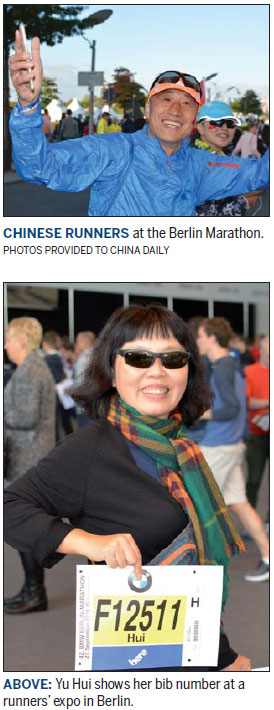
"We have corporate executives, entrepreneurs, businesspeople and employees of global Fortune 500 companies, who are considered China's emerging middle class and usually hold new ideas about health," he says. "Running marathons to them has become a new normal, a new lifestyle."
Tian certainly breaks the traditional mold of aging in China, where the retirement age for men is 60. He was one of the over-60s runners to finish the World Marathon Majors - Tokyo, Boston, London, Berlin, Chicago and New York. Prior to this year's London event, he had completed 73 marathons, including 16 last year, half of which were international races.
Others have done their own analysis of Chinese marathoners.
"I see two categories: one that is rich and well educated; the other that is rich and less educated," says Oliver Qi Wang, founder and director of Runbuk, a startup registered in the United States in March that provides services to Chinese marathoners abroad.
The first group, which may have advanced academic degrees, comprises some 65 to 70 percent of runners registered with his company. Many of them live in China's biggest cities.
The second group, which makes up 30 to 35 percent, is also well-off, but many of them did not go to college, he says. They include entrepreneurs and those from smaller cities who have worked hard to pull themselves up by their bootstraps but are now concerned about their health.
Ninety percent of those who run outside China were born in the 1960s and '70s, putting them between the ages of 37 and 56, he adds. The rest are at most 10 years younger or older.
Oliver Wang, who is also CEO of Beijing-based Palace Travel and its US branch, which has runners as clients, too, describes the situation as part of a trend that started earlier in the West, in which the wealthy middle-aged started spending lots of money on fancy bicycles, for example, instead of on sports cars.
"It's a kind of lifestyle over luxury, from spending a lot on luxuries to spending a lot on health," he adds.
Domestically, marathon fever has exploded in China. In 2014, the Chinese Athletics Association registered 51 marathon events and 900,000 runners nationwide. That mushroomed to 134 marathons and 1.5 million runners last year, according to Wang Dawei, vice-president of the CAA, which now has a marathon department. Already this year, nearly 170 marathons have been registered.
Cool running
Du says one of the reasons for the explosion in travel is that people who have run the relatively new marathons in China are looking for a taste of better-run races abroad, as well as higher athletic levels.
But in addition to that, what could be cooler than posting a selfie as you cross the finish line in Paris, Boston or Berlin, or wrapped yourself in the national flag like an Olympian?
|
Beijing running coach and freelance journalist Wang Xiaogang with his medals. He frequently takes part in overseas marathons. |
"It's not a decisive factor, but posting pictures on Chinese social media while taking part in running events in exotic locations is seen as a trendy thing for some runners," Du says.
Xie, from Shanghai, says running now dominates her life, socially and professionally. "Marathons are also a way to have a social life. I have met many friends running. It's why we get together," says the entrepreneur, who quit running a real estate company to start Save U Sports Development Co, which helps clients with equipment and advice.
Some Chinese runners are also combining marathons, social media and social responsibility.
Li Xibei, 30, an information technology worker from Central China who lives in New York City, raised funds to provide cleaner air for families in his homeland by running the North Pole Marathon this month.
Using Crowdrise, a crowdfunding website, he raised $6,030 - 18 percent more than his target sum - for the Blue Sky Lab campaign run by Friends of Nature, one of the oldest environmental NGOs in China. The program purchases materials and teaches students from low-income families in Beijing to assemble do-it-yourself air filters. The money Li raised is expected to benefit 177 families.
"I abuse myself by running in extreme sub-zero temperatures in the North Pole and you donate to help the kids in China breathe cleaner air at home," he wrote on his Crowdrise page.
Li and a female compatriot, Fan Beibei, were among about 50 runners from 20 countries who braved temperatures as low as -40 C to complete the 42-km event, which was postponed several times due to cracks in the ice. Armed guards stood watch during the race to protect runners from the threat of polar bears.
Li is also one of a small but growing group of Chinese who have completed marathons on every continent, including Antarctica.
Yet despite the current enthusiasm, the Chinese have shown themselves to be somewhat fickle in terms of their motivation for traveling abroad.
A few years ago, sports league-themed tourism prevailed, Du says. "Then, it was outdoors, and now it's running. Many runners are actually traveling in the name of running marathons."
So is it all just a fad? A number of factors suggest it isn't.
First, China's rising prosperity and its people's concern for health and fitness are unlikely to fade.
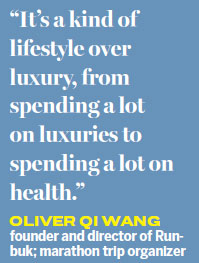
Second, the underpinnings for marathon mania have grown rapidly: Wang Dawei, of the CAA, says Chinese marathon officials frequently interact with and learn from foreign counterparts; foreign runners are coming to China; social media and traditional media built around running, such as the slick magazine Frontrunner, have become well established; and businesses are investing in the sport.
Third, and perhaps most important, are the young runners who aspire to take on international marathons.
The running bug bit Zhang Yiming, 20, a junior at Renmin University of China's School of International Relations in Beijing, in December 2014. At first, it was just a way to lose weight and stay healthy. She ran her first half-marathon in April 2015 and has been participating in races around China since then.
She runs 8 kilometers two to three times a week, which she says helps her deal with stress and keep calm.
Zhang says she plans to run two international marathons a year, with New York, Boston and Munich at the top of her wish list.
"I can't afford running abroad yet, but I'll definitely put my feet down in countries all over the world in the future. That's my dream, and it's my motivation to keep moving."
Contact the writers through matthewprichard@chinadaily.com.cn
|
Nolan Jinkai Wang, 7, son of marathon trip organizer and runner Oliver Qi Wang, shows off a friend's medal after the Berlin Marathon in 2015. Photos Provided to China Daily |
|
Zhou Lufurong (right), a marathoner's daughter, babysits 18-month-old Waylon Wang, son of marathon trip organizer Oliver Qi Wang, during the 2015 Berlin Marathon. |
|
Xie Guoping took part in the 2015 Chicago Marathon. |
(China Daily USA 04/29/2016 page4)
- UN urges DPRK to stop 'further provocative action'
- China stresses Putin's expected visit
- British FM visits Cuba for 1st time since 1959
- Trump attacks Clinton on gender, risking backlash from women
- Pirate radio poses surprising challenge in internet age
- DPRK's Musudan missile launch appears to have failed
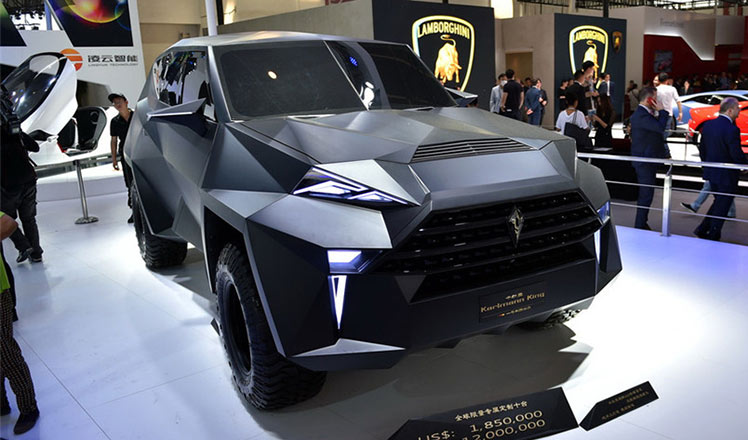
 Top 10 luxury cars at the 14th Beijing auto show
Top 10 luxury cars at the 14th Beijing auto show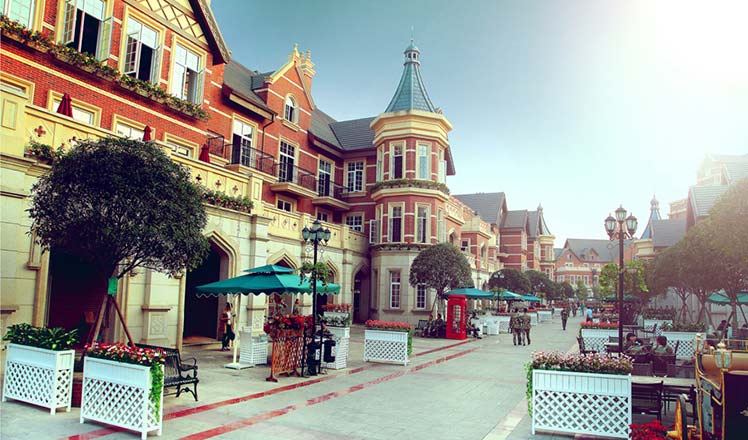
 European castle-style campus wows in Southwest China
European castle-style campus wows in Southwest China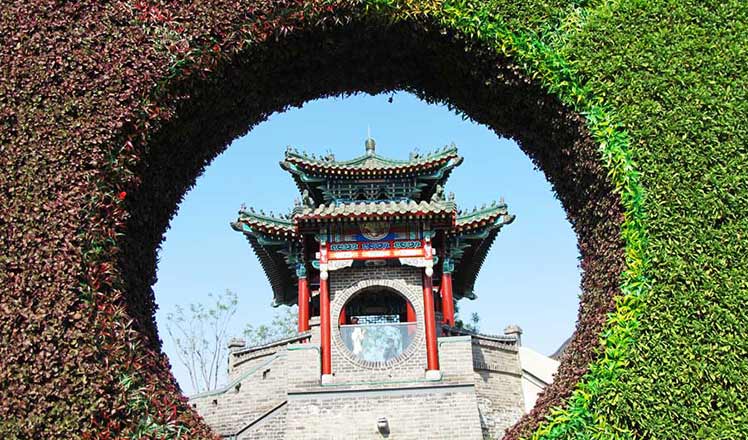
 Industrial city reinvents itself as green oasis
Industrial city reinvents itself as green oasis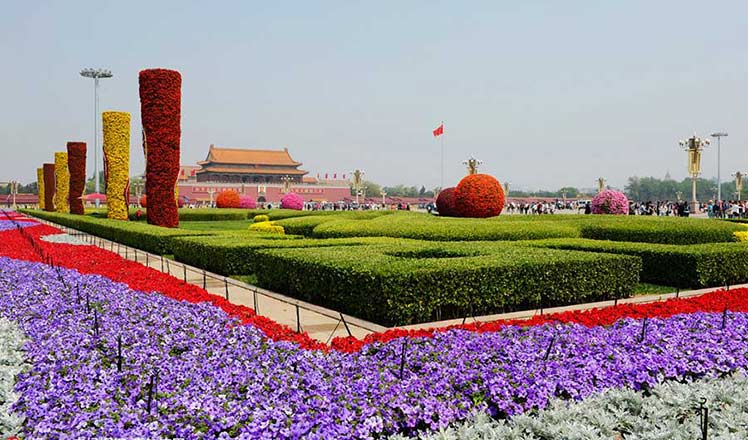
 Tiananmen Square decorated as May Day holiday approaches
Tiananmen Square decorated as May Day holiday approaches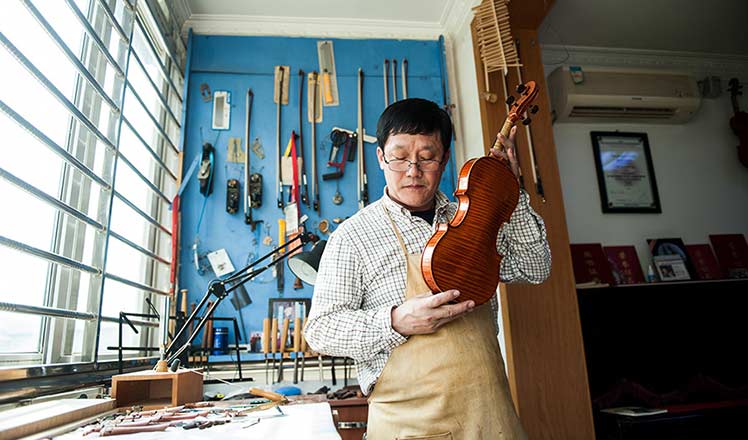
 Snapshots of modern-day Chinese at work
Snapshots of modern-day Chinese at work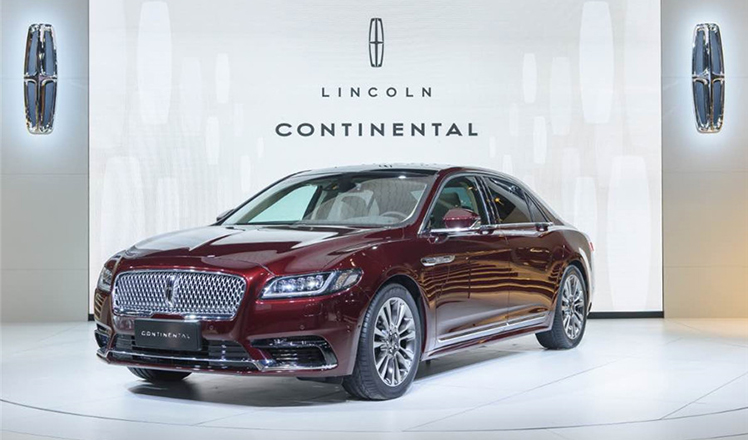
 Top 10 dazzling new car models at Beijing auto show
Top 10 dazzling new car models at Beijing auto show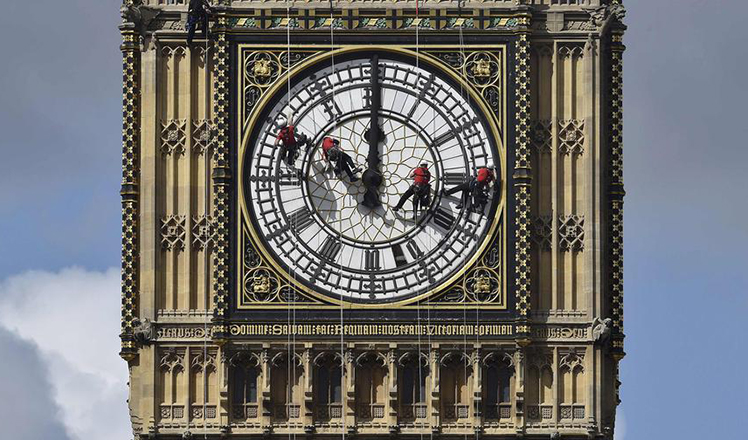
 London's Big Ben to fall silent for urgent repairs
London's Big Ben to fall silent for urgent repairs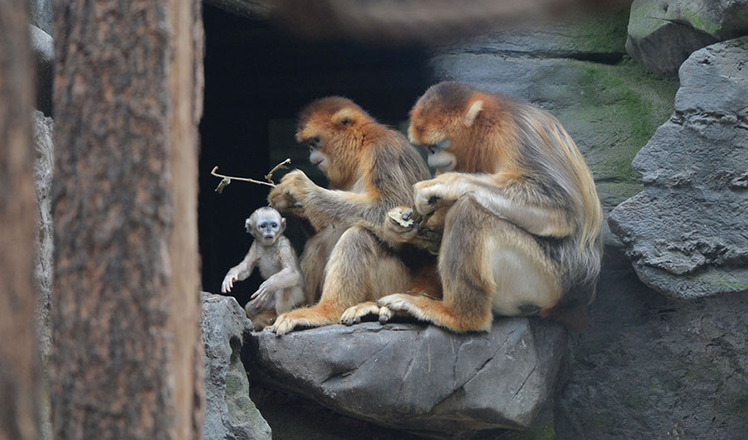
 Rare snub-nosed monkeys at Beijing Zoo
Rare snub-nosed monkeys at Beijing Zoo
Most Viewed
Editor's Picks

|

|

|

|

|

|
Today's Top News
Liang avoids jail in shooting death
China's finance minister addresses ratings downgrade
Duke alumni visit Chinese Embassy
Marriott unlikely to top Anbang offer for Starwood: Observers
Chinese biopharma debuts on Nasdaq
What ends Jeb Bush's White House hopes
Investigation for Nicolas's campaign
Will US-ASEAN meeting be good for region?
US Weekly

|

|
